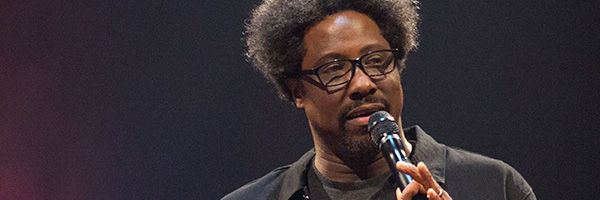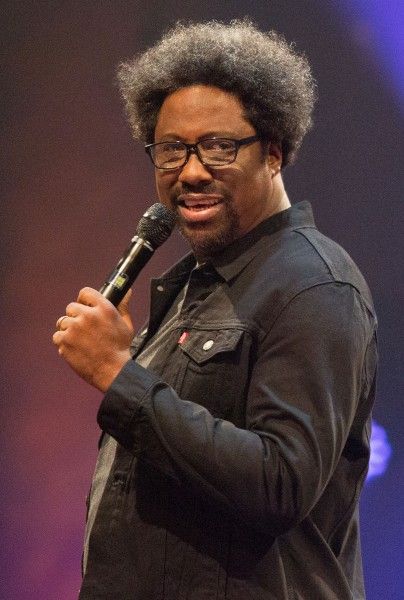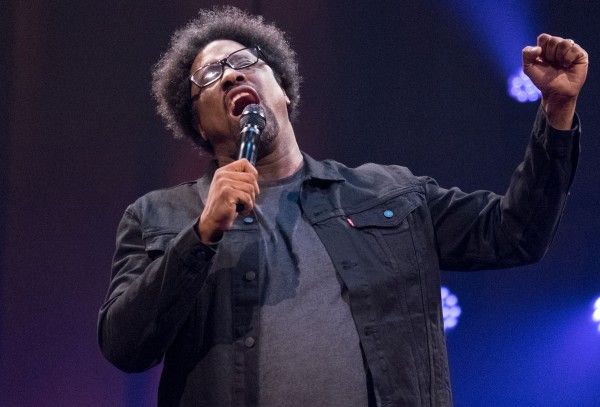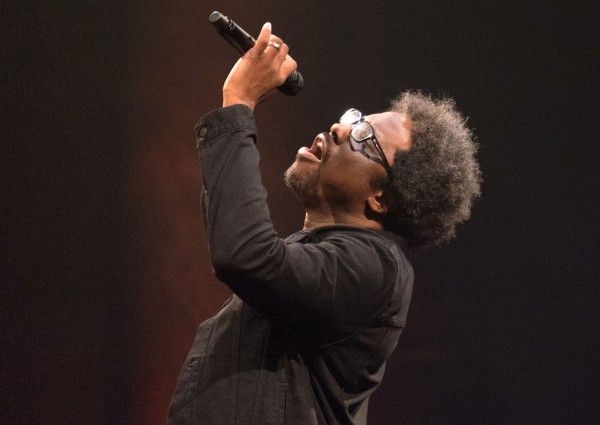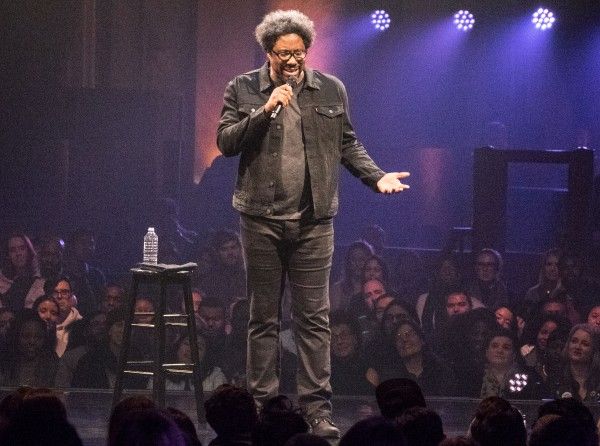Socio-political comedian W. Kamau Bell is bringing his sharp observations and quick wit to his debut Netflix special, Private School Negro (currently available to stream), which explores his thoughts on the current presidential administration, racism in America and the experience of parenting mixed race daughters. His insight and humor has been evident across three seasons of the thought-provoking CNN series United Shades of America (for which he won the Emmy Award for Outstanding Unstructured Reality Program in 2017), but his comedy special provides non-stop laughs about topics that are both personal and relatable.
During this 1-on-1 phone interview with Collider, W. Kamau Bell talked about how this Netflix comedy special came about, what rehearsing the show taught him, how he feels about Twitter criticism, always watching and observing the behavior and actions of other people, what he’s learned about the world from his own kids, how United Shades of America has changed him, personally and professionally, how his career compares to what he thought it would be when he started out as a comedian, and what saddens him and gives him hope about the world.
Collider: Thank you so much for talking to me about your Netflix comedy special! We last spoke for Totally Biased while you were at the Television Critics Association (TCA) Press Tour, back in 2013.
W. KAMAU BELL: I hope that you’ve Googled my career since then, or this conversation could get awkward.
I’m actually a big fan of your CNN show, United Shades of America, and I also went to one of the rehearsal shows you did for this comedy special at Largo in Los Angeles.
BELL: Very cool! Well, thank you!
In what ways would you say those rehearsal performances informed the actual special? Were there any things that you changed, modified or cut, as a result of actually getting a response from an audience?
BELL: I think that L.A. might have been the last show, or one of the last shows. Dwayne Kennedy, who was the opener on the show, also used to perform on Totally Biased a lot and he was a writer there, he was one of my comedy mentors, as I started, and he’s a consultant on the special. Me, him, Kevin Avery, who also wrote on Totally Biased, and then on The Jim Jefferies Show, and Owen Smith, who’s a great comedian, went to a Swingers in L.A. and basically broke down the whole hour that I had done at Largo. They were like, “Move this. Change this. I wouldn’t do that. I would do more of this. I wouldn’t do this.” At first, it was like, “I don’t know if I can do this, guys.” There was some pretty major restructuring, between the time you saw it at Largo and the time we did it for Netflix.
When you have other people talking about your material like that, and they’re telling you what you should and shouldn’t change, do you sit there and go, “Oh, my god, what are you doing to me,” or are you open to hearing criticism?
BELL: After the boot camp that was Totally Biased and having Chris Rock, at the top of his voice, scream from across the room about why a joke wasn’t working or what I wasn’t doing correctly, I’ve developed a pretty thick skin about criticism. And after having a show canceled, that you felt like you thought was maybe gonna bring down Chris Rock’s career, I really developed some thick skin tools for this business. So, there was a little bit of ego involved, but once you take the ego out and you really trust that these are funny people who have your best interests at heart and want you to succeed, it was actually a fun process. It’s not like I was saying, “Hey, Twitter, what do you guys think about this?” I don’t think people realize the comradery that comics have, who are friends and who know each other. I didn’t even know Owen that well, but he’s really good friends with Dwayne, so I trusted him. I don’t think people realize that it’s a team effort, which is why Dwayne traveled with me when we were touring. He’s one of the greatest comics in the business, so it was great to have his feedback, and I really appreciate it.
It’s probably easier to listen to criticism from people who are looking out for your best interests, as opposed to people on Twitter, where everyone is a critic.
BELL: Yeah. I employed Dwayne on Totally Biased and he’s a producer on United Shades, so he wants me to keep being employed. It’s not just that he wants the best for me, he wants the best for himself, which is fine.
Are you pretty good, then, at tuning out the criticism on Twitter?
BELL: Yeah, especially with United Shades, I’ve learned. I live tweet the episodes, when they first air, so you really open yourself up to a lot. There are lots of times, when people tell me that I did things wrong or that the show did things wrong, and I’m like, “Yeah, that’s true. We probably should have done a better job of that.” And I find that, if you say that to people, they’ll be like, “Oh, okay.” It takes the steam out. And then, the people who are just spewing nonsense, it becomes easy to ignore them or make fun of them, depending upon the mood that I’m in.
How did this comedy special come about? Was this something you were looking to do?
BELL: I really love doing stand-up. With the schedule of United Shades, I can’t do it as much as I used to, but I really love it. And then, all of these comedians started getting Netflix comedy specials. My last special was on Showtime, which was great, but the space to have a special, at one point, was HBO, and then it was Comedy Central. When Netflix was really starting to go into the comedy specials business, I know Robbie Praw, who’s one of the people in comedy at Netflix. He was one of the people who brought me to Montreal in 2005. Suddenly. I was like, “Huh, I wonder if Robbie would let me do a special on Netflix ‘cause I know he’s a big fan of mine, and we’ve stayed in touch.” So, it felt like there might be an opportunity there. The way my career works, I’m a comedian with a show on CNN. I’m not often in a place where every comedian is. But I’d been touring a little bit, and I had this hour of material that I really enjoyed and I thought, “Is this something I wanna leave, as a permanent record, or is this just stuff that I’m doing on stage?” Because it was about all the change between Obama and Trump, and how it affected my family, and I was living in Berkeley, at the time, and it seemed like Berkeley was this national news story, it just felt like I had some stuff to say that I think is unique to me.
A lot of the special explores racism in America, which is seems is unavoidable these days, whether it’s because of the current presidential administration or just going to different places, and even when it comes to your own family. Are you someone who’s just always watching and observing and making mental notes about everything that happens, all the time?
BELL: Because I’ve spent a lot of my life as a stand-up comedian, or as somebody who’s trying to do stand-up comedy, my brain is always running in the background, like a computer. I’m like, “Look at that. Oh, that’s interesting.” I’ve always written a lot on stage. I used to have notebooks, but I don’t even keep notebooks anymore. Basically, before I get on stage, I just get a blank piece of paper and a sharpie, and I write down the thoughts that have been in my head. I put them on a piece of paper, so that I can look down at them, during my set. And then, on stage, a lot of that stuff sort of comes out that I’m not even aware that was really in there. Often, I find that the more specific you are, the funnier it is.
You’re obviously familiar with the black experience, but now you’re surrounded by women, with your wife and three daughters, and you have mixed race kids. What has most blown your mind about watching them and what you’ve learned from watching them, and from seeing how other people view them?
BELL: There’s definitely an exotification of mixed raced kids. When you’re walking around with your kid – and I talked about it in my last special – you feel a little gross sometimes. We raise our little girls to be respectful in life, but also to speak out when you feel like you need to speak out. A lot of little girls aren’t raised that way. And then, we all know that little boys are pretty much universally horrible. Little boys are just being raised in a feral way. They put them in a suit and send them to a corporation and wonder, “Why’s that guy such a jerk?” I feel like raising my daughters, I can give them inside information on dudes that I feel will help them in life. A lot of little girls are told to always be polite and be respectful, which is fine when it’s time to be polite and respectful, but also don’t let that boy push you. It’s funny, just this past weekend, I was at a thing with my daughter and with a bunch of kids from her school, and she ran to me. She’s seven and she said, “One of the boys pushed me.” I was like, “What happened?” And she was like, “I don’t know. He just pushed me.” I was like, “That’s just how boys are.” And she was like, “Why?” I was like, “I don’t know.” It felt really good to just be like, “You have to be prepared for this to happen in the world, so let’s figure out a way for you to stand up to him and tell him to stop pushing.” I feel like I’m a double agent, when it comes to raising my girls. I’m giving away all the deep secrets.
I think the work that you do on United Shades of America is so important. How has doing that show changed you, personally and professionally?
BELL: Professionally, it’s interesting. Once we profile a city, I find that when I go back to that place, I feel like I’m a member of the family, just not so much with the Klan. I was pretty critical of Portland, but when I went to Portland, people were just like, “Yay!” I find that it allows people in the location we film in to feel like they’re being seen, maybe sometimes for the first time, in a national way. Now for me, I dropped out of college, but I feel like I really am working on this independent ethnic studies major that I wish I was getting credit for. Forget more woke ‘cause that’s really in the eyes of the beholder, but it definitely makes me a smarter person. I know a lot more, and with every episode, I’m learning things that I had no idea about and wouldn’t know about ‘cause I wouldn’t have Googled it or read that far down the Wikipedia page. I absolutely feel great about the fact that I’ve had a lot of conversations I would have never had and I’ve learned a lot that I never would have learned, as a person who dropped out of college. It feels good to be continuing on with my educational process, at this point in my life, and having a career off of that. But for me, I would say that there are times on the show where, if we didn’t film it and air it on TV, I’d still get to have the story and the experience.
Between the comedy special and the TV series and now an Emmy, is the career path that you’re on now anything at all like what you’d envisioned for yourself?
BELL: Oh, no! When I started doing comedy, it was the ‘90s and, in my mind, I was like, “Well, I’ll do stand-up for three years in Chicago, then I’ll move to L.A., and then I’ll go to the Montreal Comedy Festival, get a development deal, and get a TV show based on my life. It was the Seinfeld model, or the Tim Allen model, or the Roseanne model. That was what comics did. And then, after the TV show is successful, I’d write a book. And then, when the book was successful, I’d be in one of the Lethal Weapon movies, like Chris Rock in Lethal Weapon 4, ‘cause that was the journey. But then, when I started doing comedy, the comedy boom crashed, and I also wasn’t that good. The world wasn’t looking for comedians, and also, I sucked. And so, for ten years, I just farted around, not getting any better. Finally, I was like, “It’s on me to get better.” At that point, I just started following my nose and didn’t worry about whether I was gonna get a TV show based on my life. And then, one day, you end up sitting in Jeff Zucker’s office, talking about working at CNN and you’re like, “What the fuck is happening?!” I’ve found that in my life that that's how these things come together a lot. Like the best things that happen for me, in my career, it’s hard work and luck. I thought I could do a Netflix special, so I pursued them. But no, when I was 21, you couldn’t have explained to me that this would be my career. I would have been like, “Comedians don’t have shows on CNN. What’s a podcast? Streaming on the internet? There’s no such thing as the internet!” It wouldn’t have made sense. Now, I look at Kevin Hart’s career and he’s basically doing everything that I’m doing, except for the CNN show ‘cause he hasn’t asked for one yet. He has the comedy career that you dream of having wen you think, “I will become a big comedian and I’ll be presented with all the things, like the movies and the books, and everything.”
What would you say most saddens you about the world that we’re currently living in, and what most gives you hope?
BELL: The thing that’s sad is that there’s still a large percentage of people in this country who are more excited about Donald Trump pissing people off than America becoming a country that is good for all of us. They would rather see Donald Trump piss off liberals, than have Donald Trump give them a job that pays them more money or provides them with good healthcare. Those people are going to be that way, but it just feels like it’s so many people. Also, the electoral college makes me sad, too. With the electoral college in place, we can’t just count on winning hearts and minds. We need to win hearts and minds in places where they may not be interested in having hearts and minds because they aren’t thinking with their heads or using their hearts. That’s really depressing.
What gives me hope is that my kids are awesome and woke and amazing. I feel like, as long as me and my wife fan the flames of their fire and not get in their way, they might be the ones to save the world. I really do like my kids. I’d wanna be friends with my kids, if I didn’t know my kids. It’s hard to be a parent, and every parent knows that you don’t get points for saying that it’s hard to be a parent. I see how aware they are of the world, how sweet they are, how smart they are, and how interested they are, in finding out things. We need people who are like that, to make sure the future goes in the right direction. I don’t know what’s gonna happen in the future. I feel optimistic that things will get better, but I don’t think things will get better unless I get less sleep and work harder. That means working harder on my career, but also working harder on the world.
W. Kamau Bell: Private School Negro is available to stream at Netflix. United Shades of America airs on Sunday nights on CNN.

